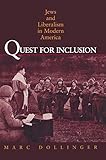Quest for Inclusion : Jews and Liberalism in Modern America / Marc Dollinger.
Material type: TextPublisher: Princeton, NJ : Princeton University Press, [2022]Copyright date: ©2000Description: 1 online resource (312 p.)Content type:
TextPublisher: Princeton, NJ : Princeton University Press, [2022]Copyright date: ©2000Description: 1 online resource (312 p.)Content type: - 9781400823857
- Jews -- United States -- Politics and government -- 20th century
- Liberalism -- United States -- History -- 20th century
- HISTORY / Jewish
- AFL (American Federation of Labor)
- American Civil Liberties Union
- American Jewish Conference on Soviet Jewry
- American Jewish Labor Council
- American Palestine Committee
- Arent, Albert E
- Bakke case
- Ben-Gurion, David
- Black Muslim
- Board of Rabbis (New York)
- Brown, Josephine
- Carmichael, Stokely
- Columbus Platform
- Democratic party
- Edelstein, Nathan
- Executive Order 8802
- Flaherty Bill (HR 5454)
- Forster, Arnold
- General Jewish Council
- German-American Jews
- Grier, George and Eunice
- Hebrew Union College
- Hirabayashi case
- Hopkins, Harry
- Israel Emergency Fund
- Jackson, Mississippi
- Jewish Federation Council
- Jewish Rights Council
- Kaplan, Mordechai
- Kaufman, Menaham
- Korematsu case
- Levin, Arthur
- Lindbergh, Charles
- Lippmann, Walter
- Marshall Plan
- National Brotherhood Week
- Nye, Gerald
- Pittsburgh Platform
- Protestant church
- Reagan, Ronald
- affirmative action
- civil libertarianism
- civil rights movement
- community chests
- displaced persons
- enemy aliens
- enlightenment (European)
- freedom bus
- immigration reform
- internment
- isolationism
- neo-conservatism
- 973/.04924 21
- E184.36.P64
- E184.36.P64
- online - DeGruyter
| Item type | Current library | Call number | URL | Status | Notes | Barcode | |
|---|---|---|---|---|---|---|---|
 eBook
eBook
|
Biblioteca "Angelicum" Pont. Univ. S.Tommaso d'Aquino Nuvola online | online - DeGruyter (Browse shelf(Opens below)) | Online access | Not for loan (Accesso limitato) | Accesso per gli utenti autorizzati / Access for authorized users | (dgr)9781400823857 |
Frontmatter -- Contents -- Acknowledgments -- List of Abbreviations -- "Die Velt, Yene Velt. ..": An Introduction -- Chapter 1. "What Do We Owe to Peter Stuyvesant?" The New Deal in the Jewish Community -- Chapter 2. Fighting Hitler: Cultural Pluralism and American Jewish Life, 1933-1941 -- Chapter 3. "The Hope of Democracy and Peace": American Jews and the Campaign for Intergroup Dialogue, 1933-1941 -- Chapter 4. "Unless That War Be Won, All Else Is Lost": American Jews and the Home Front -- Chapter 5. Planning the Postwar Peace: The United Nations, Zionism, and American Jewish Liberalism -- Chapter 6. The Struggle for Civil Liberties: The Cold War, Anti-Communism, and Jewish Liberal Reform -- Chapter 7. "Hamans and Torquemadas": Southern and Northern Jewish Responses to the Civil Rights Movement, 1945-1965 -- Chapter 8. A Different Kind of Freedom Ride: American Jews and the Struggle for Racial Equality, 1964-1975 -- 'Just Another Foreigner' An Epilogue -- Notes -- Index
restricted access online access with authorization star
http://purl.org/coar/access_right/c_16ec
For over sixty years, Jews have ranked as the most liberal white ethnic group in American politics, figuring prominently in social reform campaigns ranging from the New Deal to the civil rights movement. Today many continue to defy stereotypes that link voting patterns to wealth. What explains this political behavior? Historians have attributed it mainly to religious beliefs, but Marc Dollinger discovered that this explanation fails to account for the entire American Jewish political experience. In this, the first synthetic treatment of Jewish liberalism and U.S. public policy from the 1930s to the mid-1970s, Dollinger identifies the drive for a more tolerant, pluralistic, and egalitarian nation with Jewish desires for inclusion in the larger non-Jewish society.The politics of acculturation, the process by which Jews championed unpopular social causes to ease their adaptation to American life, established them as the guardians of liberal America. But, according to Dollinger, it also erected barriers to Jewish liberal success. Faced with a conflict between liberal politics and their own acculturation, Jews almost always chose the latter. Few Jewish leaders, for example, condemned the wartime internment of Japanese Americans, and most southern Jews refused to join their northern co-religionists in public civil rights protests. When liberals advocated race-based affirmative action programs and busing to desegregate public schools, most Jews dissented. In chronicling the successes, limits, and failures of Jewish liberalism, Dollinger offers a nuanced yet wide-ranging political history, one intended for liberal activists, conservatives curious about the creation of neo-conservatism, and anyone interested in Jewish communal life.
Mode of access: Internet via World Wide Web.
In English.
Description based on online resource; title from PDF title page (publisher's Web site, viewed 29. Jun 2022)


